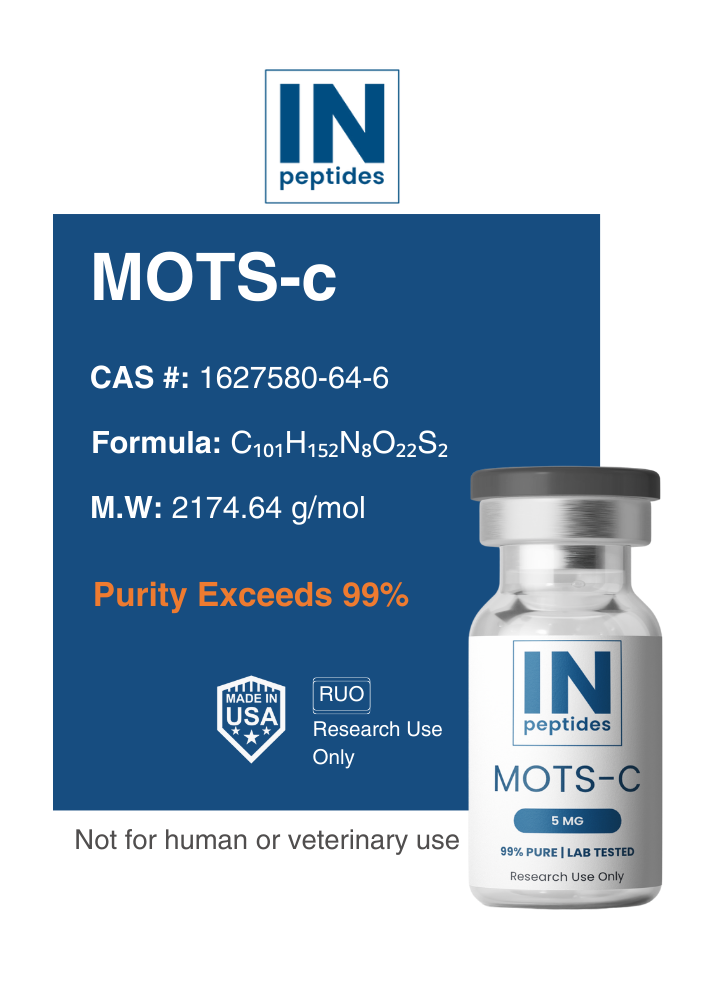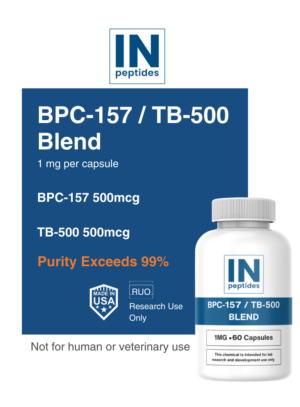MOTS-C 5mg
$50.00
MOTS-c 5mg
MOTS-c is a mitochondrial-derived peptide involved in regulating metabolic processes and improving cellular energy production. Known for its role in influencing glucose metabolism, fat burning, and insulin sensitivity, MOTS-c is being studied for its potential to enhance overall metabolic health. By optimizing mitochondrial function, it may have beneficial effects on fat loss, exercise endurance, and even slowing age-related metabolic decline. The 5mg dosage offers a convenient form for researchers investigating its role in metabolic diseases, aging, and performance optimization.
Potential Research Applications
MOTS-c 5mg is currently being explored in research settings for its role in:
- Insulin Sensitivity & Glucose Metabolism: Investigated for its potential to enhance insulin sensitivity and regulate glucose metabolism, particularly in research related to type 2 diabetes and metabolic disorders.
- Fat Loss & Weight Management: Researched for its ability to promote fat oxidation, improve weight management, and support a healthier body composition by enhancing mitochondrial function.
- Exercise Endurance & Performance: Explored for its potential to increase energy production at the cellular level, improving endurance and overall exercise performance.
- Anti-Aging & Mitochondrial Function: Studied for its effects on slowing age-related mitochondrial dysfunction and supporting cellular health, potentially contributing to better longevity and vitality.
✔ High-Quality Research Peptide – Produced under stringent quality control standards.
✔ Lab-Tested for Purity – Ensures consistency for scientific studies.
✔ Research Use Only – Not for human consumption or medical applications.
✔ Peptides – Will arrive in a lyophilized (powder) form for maximum stability.
The peptides are available for research and laboratory purposes only. Please review and ahere to our Terms and Conditions before ordering.
- Description
- Certificate of Analysis
MOTS-c (Mitochondrial Open Reading Frame of the 12S rRNA-c) is a mitochondrial-derived peptide. It has gained attention for its roles in metabolic support, aging, and energy homeostasis. Unlike most peptides, MOTS-c comes from the mitochondrial genome, not nuclear DNA. Mitochondria produce energy in cells. Consequently, researchers are exploring how MOTS-c affects metabolism and longevity.
One of the primary roles of MOTS-c is regulating metabolic processes. It promotes insulin sensitivity, which is crucial for blood sugar control. Studies show MOTS-c enhances glucose uptake into cells, which helps reduce insulin resistance.
In addition to regulating metabolism, it also affects mitochondrial function and cellular energy. Mitochondria produce ATP, the cell's primary energy. However, their function declines with age. Research shows MOTS-c improves mitochondrial activity, which may boost energy production and delay age-related dysfunction. By supporting mitochondrial health, MOTS-c could promote healthy aging and prevent age-related diseases.
Furthermore, MOTS-c shows potential for enhancing exercise performance. Studies suggest that it improves endurance by increasing energy efficiency. This benefit may help people involved in endurance activities or those working to improve fitness. Moreover, it also affects fat metabolism. It increases fat oxidation during exercise, which could improve body composition.
In addition to its metabolic benefits, researchers are also exploring MOTS-c as an anti-aging agent. Its ability to regulate metabolism, improve insulin sensitivity, and support mitochondrial function may extend healthspan. Healthspan refers to living in good health, free from age-related diseases. Therefore, it could help slow age-related diseases and support cellular vitality.
Although research on MOTS-c is still in its early stages, its unique role in metabolism, aging, and energy is gaining significant interest. However, more research is needed to fully understand its effects, mechanisms, and safety.
For Research Use Only
No Certificate of Analysis images available for this product.











